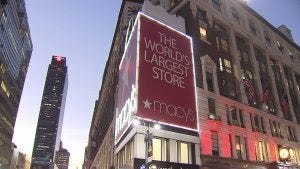Macy's lawsuit claims security guards have arrest quotas and a 'race code system' for nonwhite shoppers

From the minute you walk into Macy’s until you leave, you are being watched. There are surveillance cameras everywhere that cover almost every square inch of the store. Some are so sophisticated that they can read the address on your drivers license.
KTRK legal analyst Joel Androphy says Gainous cold have refused. “If you walk into a store, you don’t sacrifice your personal liberties just because you’re shopping there.”
Macy's security guards worked on a quota system of five “arrests” per week — and nonwhite shoppers were identified by an internal “race code system,” according to a lawsuit.
The security guard, Brenda Howard, is named in the suit.
African-American men were referred to as “10-90s” and black women as “10-91s” among store security personnel, a Turkish immigrant charged in court papers after her 2010 arrest. The demeaning code was created by Macy’s “to facilitate its targeting of Middle Eastern, African-American/black and other nonwhite shoppers,” the suit charged.
Regarding the coding system for identifying shoppers, the retailer said what is known as the "10 Code System" is common and standard in the industry.
"The 10 code system is widely used by law enforcement and the military. It is an abbreviated form of communication that is solely used over radio," the statement red. "Ten codes are designed to prevent confusion or misunderstanding, and convey important information when identifying a person over radio communication. In no way do they imply targeting or categorizing of individuals."
The allegations have grabbed the attention of New York State Attorney General Eric Schneiderman, who sent letters to Barneys New York and Macy's executives on Monday asking to meet with them to discuss the cases and requesting documentation by Friday that includes:
The store's policies and procedures for stopping, detaining and questioning customers
Numbers of stops and detentions of customers between Oct. 15, 2012 and 2013, broken down by race
Anti-discrimination policies
Customer complaints
Copies of contracts or agreements with private security firms, law enforcement agencies or other security entities
Training materials for store personnel
Plaintiff Ayla Gursoy, who is Muslim, said she was detained and arrested while shopping in the Herald Square store on Sept. 18, 2010. Charges were later dismissed.
In a partial deposition provided by her attorney, store detective Brenda Howard acknowledged five “arrests” per week was the target for security workers, according to the suit. Howard couldn’t be reached Tuesday. The attorney did not provide the full deposition.
http://www.nydailynews.com/new-york/macy-security-arrest-quota-race-code-system-suit-article-1.1501037
http://www.usatoday.com/story/news/nation/2013/10/30/macys-barneys-quotas-guards/3318115/
http://www.bizjournals.com/cincinnati/morning_call/2013/10/macys-guard-speaks-out-about-arrest.html
http://dmnewsi.com/2012/04/13/reporters-notebook-over-zealous-macys-security-gets-wrong-woman/
Profiling complaints by black shoppers followed changes to stores’ security policies:
A meeting was convened at Barneys New York to discuss a growing problem: A significant amount of inventory was being lost to theft. Something had to be done.
A new security management team instituted a more aggressive loss prevention strategy. Security personnel said they were encouraged to “take chances” in stopping suspicious customers, even if it meant intercepting innocent people. Bad grabs, they said they were told, were part of the business.The number of contacts with the Police Department, made when security workers suspected a person had been shoplifting or engaging in credit card fraud, soon jumped drastically.
But along with the increase in cases, complaints began to surface from black shoppers who said they were victims of racial profiling in the store, on Madison Avenue. At least one shopper has filed a lawsuit against Barneys, and another plans to.
The lawsuits, which came to light last week and landed on the front page of The Daily News, attracted national attention for their allegations of race- and class-based discrimination. The suits raised criticism not only of Barneys, but of celebrity figures, like Jay-Z, who has a partnership with the store.
At the flagship Macy’s store at Herald Square, at least two black shoppers, one of them the actor Robert Brown, of the HBO series “Treme,” have said they were similarly stopped this year by the police after, they said, store security workers deemed their purchases suspicious. Mr. Schneiderman’s inquiry also includes Macy’s.
None of those who have come forward to say they were detained by the police were charged with any crime.
The accusations were particularly troublesome for Macy’s, which, in 2005, reached an agreement with the state attorney general’s office to amend its security practices after investigators found black and Hispanic shoppers were disproportionately stopped on suspicion of shoplifting. That agreement ended in 2008. This year, said an official familiar with the current investigation who was not permitted to comment publicly on its details, the state attorney general has received close to a dozen complaints from shoppers who said they had been profiled by security officers at Macy’s. http://www.nytimes.com/2013/10/30/nyregion/black-shoppers-at-barneys-and-macys-say-they-were-profiled-by-security.html?_r=0
NYPD & Barney's arrested a black college student for buying a designer belt:
A college student from Queens got more than he bargained for when he splurged on a $350 designer belt at Barneys — when a clerk had him cuffed apparently thinking the black teen couldn’t afford the pricey purchase, even though he had paid for it, a new lawsuit alleges.
“His only crime was being a young black man,” his attorney, Michael Palillo, told The Post.
http://nypost.com/2013/10/22/barneys-busted-student-for-being-black-suit/?utm_campaign=SocialFlow&utm_source=NYPTwitter&utm_medium=SocialFlow


